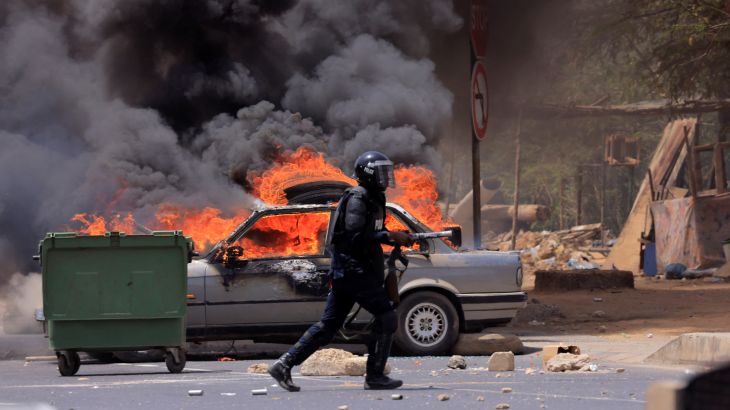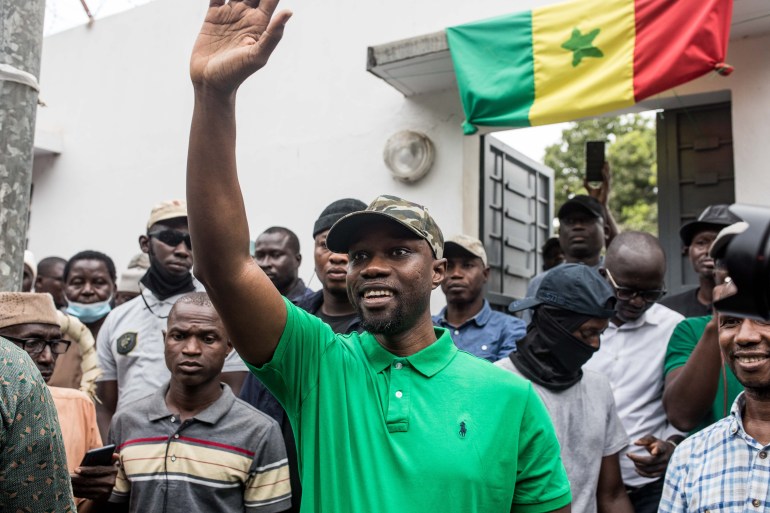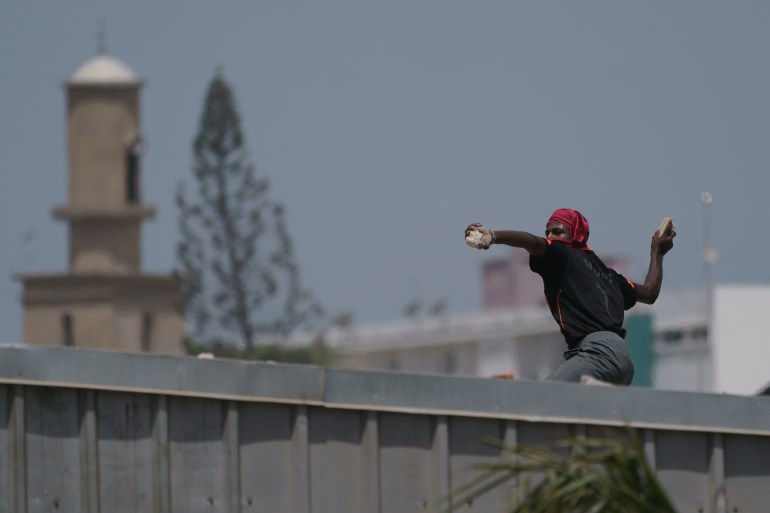Senegal’s Sonko can be arrested ‘at any time’: Justice minister
Violence ongoing after Senegal court sentences opposition leader Ousmane Sonko for ‘corrupting youth’, clears him of charges of rape and issuing death threats.

Protests have erupted in Senegal’s capital, Dakar, after a court sentenced the leading opposition figure Ousmane Sonko to two years in jail for “corrupting youth”, dealing a blow to his chances of running for president next year.
Sonko, 48, was accused of raping a woman who worked in a beauty salon in 2021 and making death threats against her. He has denied wrongdoing and is boycotting court proceedings.
Keep reading
list of 3 itemsSenegalese court increases opposition leader’s sentence
Senegal opposition leader given 2-month suspended term for libel
The court on Thursday acquitted Sonko of charges of rape and issuing death threats, but found him guilty of a separate criminal offence described in the penal code as immoral behaviour towards individuals younger than 21.
Against a backdrop of violence, Justice Minister Ismaila Madior Fall told reporters Sonko can be arrested “at any time”.
“The sentence must be carried out. This is an in absentia case, and the measure can be carried out at any time,” he said.
The case has triggered violent protests, with Sonko’s supporters denouncing the charges against him as politically motivated, which the government and justice officials have denied.
Sonko’s Patriots of Senegal (PASTEF) party said the verdict was part of a political plot and called on citizens to take to the streets.
Violence erupted at a central university campus, where protesters set a car alight and threw rocks at riot police, who responded by firing tear gas.
Al Jazeera’s Nicolas Haque, reporting from the road leading to Sonko’s house, said “police are overwhelmed” with the protests, which have spread beyond Dakar to other major cities in the country including Ziguinchor.
“There is sheer anger at this verdict that came out of the court earlier today … the fire that we see breaking out is actually at the [university’s] faculty of law. It’s a symbol of how these demonstrators feel towards the justice system,” Haque said.
“They accuse President Macky Sall of using the justice system to clamp down on the opposition and to detain political opponents or political rivals.
“This is very unusual. Senegal is the most stable democracy in the region. It has a history of freedom of speech and yet over 500 people have been arrested – journalists, members of civil society or the opposition.”
Sonko has maintained his innocence and claims President Macky Sall is manipulating the judiciary to torpedo his political career – a charge the government has denied.
If he had been convicted of rape, he would have faced up to 20 years imprisonment.
His electoral eligibility had already been overshadowed by a six-month suspended prison sentence for defamation against a minister. Sonko is appealing that sentence.
Corrupting young people, which includes using one’s position of power to have sex with people under age 21, is a criminal offence in Senegal that is punishable by up to five years in prison and a fine of up to more than $6,000.
Under Senegalese law, his conviction would bar Sonko from running in next year’s election, said Bamba Cisse, a defence lawyer.
“The conviction for corruption of youth hinders his eligibility because he was sentenced in absentia, so we can’t appeal,” Cisse said. Law professors in Senegal said the verdict can be appealed but only once Sonko is imprisoned.

‘Sad day for Senegal’s democracy’
Adama Gaye, author, journalist and former director of information at the Economic Community of West Africa States (ECOWAS) told Al Jazeera that the government has influenced the verdict.
“It’s a very sad day for Senegal’s democracy. Senegal was known for dirty politics, but that is what we are witnessing now. This may usher a lot of tensions as we move towards the 2024 presidential elections,” Gaye said.
“The government is adamant about maintaining law and order. It will try to abide by the decision made by the justice and this is clearly a decision that is somehow masterminded and doctored by the government, because justice in Senegal is clearly controlled by the executive.”
Tensions were rising across the country before Sonko’s conviction and sentencing. Tight security surrounded the court, as well as Sonko’s house, and many businesses closed for fear of violence.
On Thursday morning, security forces prevented journalists and Sonko’s supporters from approaching the house, throwing tear gas without warning at a group of reporters.
Haque said the reason why the election is “so contentious” is “because Senegal has enormous reserves of oil and gas.
“Whoever becomes president in February 2024, will be at the helm of one of the largest reserves of liquified national gas in Africa, and because of the Russia-Ukraine crisis, Europeans are desperate to pump out the gas to power their homes. What’s happening in Europe is fuelling this uncertainty and this political tension here in Senegal and West Africa.
“We’ll see if the security forces are able to go through this road, up the road ahead and get Sonko out of his house to put him in jail. But will the people here in Senegal, his supporters accept this? That’s the big question,” Haque said.
The court also sentenced Sonko’s co-accused, Ndeye Khady Ndiaye, the owner of the beauty salon, to two years imprisonment.
